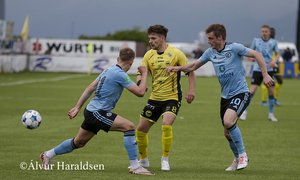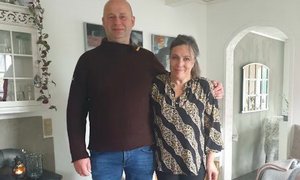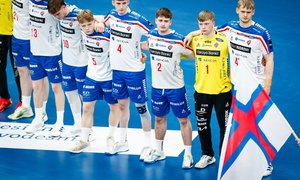The main theme tonight is of course the Faroe Islands, and indeed the whole area between the Faroes and Shetland, as an area for oil and gas exploration.
As a Minister for Research, I find it tremendously intriguing to think about oil exploration in this area, also known as the Atlantic Margin, as an activity quite similar to searching for the famous needle in the haystack.
And – mind you – here we are talking about an immensely huge haystack! Not only that – most of the haystack we can’t even see, and must just guess about its size and composition.
Of course, we know that modern technologies have made it possible to come up with quite accurate descriptions of the different layers of rock and sediments thousands of metres below the surface.
On this background it is possible to make predictions of what you may find deep down, but one is always taking a risk, and you will not know if you find anything, before you actually hit it with the drill.
Let me now, ladies and gentlemen, reassure you that I will not dive further into the technicalities, as it would neither do you or me any good. We will in the next few moments hear people, who know far more about these matters.
- - - -
I will now turn to the Faroese society and political system as such, to give a brief overview of what kind of entity our country is, and what kind of challenges and possibilities lie ahead.
You may be aware that the Faroes as an autonomous country constitute a special territory in the Kingdom of Denmark.
Situated between Scotland and Iceland, the Faroes are together with Shetland situated in the area, which is known in oil circles as the Atlantic Margin.
This very oceanic location has for natural reasons meant that we have been, and still are heavily dependent upon fisheries and other marine activities.
As a fisheries dependent country, we have an urgent need to diversify the economy. We have seen the economy grow and diversify for more than a decade now, since the recovery from the recession of the early 90ies.
What must be striking about the Faroese economy, seen from an outsider’s view, is that we have an extremely tiny economy in a population of just under 50,000, and a total workforce of 26,000, of which 66% are employed in the service sectors, while under 20 % are employed in the fisheries sector.
This indicates that, after all, some degree of diversification has indeed taken place.
Looking at some positive indicators, I could point to the following:
The level of economic activity is high, with a record low unemployment rate now at 1.4 %.
We have somehow managed to create a viable economy, even though it is very tiny and very remote from most other nations, where the standard of living is among the medium-high range compared to Western Europe as a whole.
Astonishingly as it may sound, and very pleasing for me as Minister for Research and Education, the Faroese people are in fact amongst the best educated in the world, and of the Nordic countries only the Finnish population actually has a higher degree of education than the Faroese.
Infrastructure is good with subseatunnels and bridges connecting six of the islands whith over 80 % of the population. Moreover, the IT penetration is near 100 %.
We are now about to undertake significant investments in the Vagar airport both with the aim to modernise it and to increase its capacity with a longer runway and a larger terminal.
The Faroese government acknowledges that the world is getting smaller with all the well known strands of globalisation in mind, and this situation is not least beneficial for the smallest actors on the international arena.
You might say that the smaller your own home market, the more active you have to be on other markets.
We aim at being an open and competitive economy, and we want a relatively smaller public sector to be efficient and concentrate on delivering welfare services, while private businesses should take care of the production of goods and services such as financial services.
For this reason we have started a privatisation process, where we have sold two thirds of the shares in the publicly owned bank, Føroya Banki, and are planning to seld the last third quite soon.
We are also going to privatise the airline, Atlantic Airways, the life insurer, Lív, and other public businesses.
The Faroese system of self-government, or Home Rule, is a basic condition for the positive development of our society. That is also why we are still expanding our degree of political independence.
We are convinced that no one is better situated to plan for our own good and take decisions concerning the direction of our land than we are, who actually inhabit the islands.
Along the same line of reasoning we are now in a process of building up our own foreign service with four representations abroad – where the fourth one opened just last weekend in Reykjavík, the capital of Iceland.
We are approaching the wider world, not least the EU, in many ways to engage in negotiations and deals, which we think will provide better opportunities in the future.
- - - -
Regarding a coming oil industry, it is immensely important that our government is in full control over all recourses in the Faroese subsoil.
We are aware that the day oil revenues come flooding into our small society, they will put a lot of strain on us, and especially us politicians.
However, this is something that we have anticipated, and we agree broadly across the political spectrum that massive revenues from oil or gas developments in our area shall be channelled into some sort of Petroleum Fund, much along the lines of the renowned Norwegian fund.
Such a fund will be designed to ensure strategic spending and long lasting benefits for the Faroese people.
When we talk about a coming oil industry in the Faroes, we must also remember that there are other implications to the issue. Environmental implications, not least.
And here we have at least two sorts. First, we will of course secure our immediate natural environment against pollution and accidents, which of course is a serious matter, and luckily a matter that we know that also the oil industry itself takes very seriously.
Second, there is the whole issue of fossil fuels and their implications, through rising carbon emissions, on climate change.
Of course, we also know that oil and gas will not be in stock forever, and that the prices will rise even much further, when the still growing demand really puts pressure on the supplies.
We have therefore many good reasons already now to look for alternatives to fossil fuels, even though we know that we will be quite dependent upon them for still more decades to come.
In the Faroes we already get almost half of the power for our electricity consumption from renewable sources, from water and wind turbines. On the other hand we use great amounts of oil on land on heating and in cars, and on the sea in our vast fishing fleet.
We are aware of the serious challenges in this regard, and will do our utmost to combine an emerging oil industry with a process, where we develop alternative sources of power.
There doesn’t need to be any conflict of interests between exploring for oil and developing an oil industry and at the same time to look for other ways of producing energy. We need the oil, and incomes from oil can help us invest in alternative and renewable energy.
On the whole, I see good reasons to be optimistic, but at the same time careful, about possible oil findings and developments in a near future in and around the Faroe Islands in the near future.
Thank you














